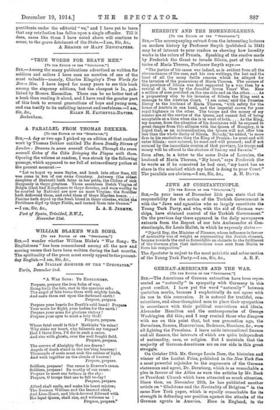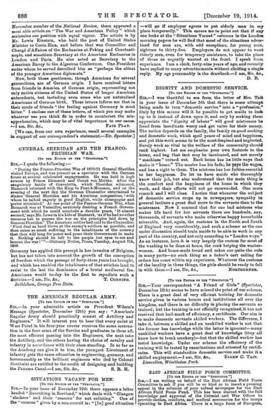GERMAN-AMERICANS AND THE WAR. r To VIZ EDITOR or THZ
" SPECTATOR:1 SIR,—The Americans of German extraction have been repre- sented as " naturally " in sympathy with Germany in this great conflict. I have put the word "naturally" between quotation marks, because I emphatically do not agree with its use in this connexion. It is natural for truthful, con- scientious, and clear-thoughted men to place their sympathies in accordance with their political convictions and ideals. Alexander Hamilton and the contemporaries of George Washington did this ; and I may remind those who disagree with me on this point that, but one generation ago, the Bavarians, Saxons, Hanoverians, Badeners, Hessians, &c., were all fighting the Prussians. I leave aside international finance and all finance, the interests of which are quite independent of nationality, race, or religion. But I maintain that the majority of German-Americans are on our side in this great struggle.
On October 18th Mr. George Louis Beer, the historian and winner of the Loubat Prize, published in the New York Sun a most powerful rejoinder to the arguments of the German statesman and agent, Dr. Dernburg, which is as remarkable a plea in favour of the Allies as were the articles by Mr. Beck or President Church which have attracted so much attention. Since then, on November 25th, he has published another article on " Gladstone and the Neutrality of Belgium " in the same New York paper, which is equally remarkable for its strength in defending our position against the attacks of the German agents in America. Here in England, in the November number of the National Review, there appeared a most able article on " The War and American Policy" which maintains our position with equal vigour. The article is by Mr. Lewis Einstein, who held the post of United States Minister to Costa Rica, and before that was Councillor and Chargé d'Affaires of the Embassies at Peking and Constanti- nople, and sometime Secretary at the American Embassies in London and Paris. He also acted as Secretary to the American Envoy to the Algeciras Conference. One President under whom be served described him as " perhaps the ablest of the younger American diplomats."
Now, both these gentlemen, though American for several generations, are of German origin. I have received letters from friends in America of German origin, representing not only native citizens of the United States of longer American antecedents, but including even some who are naturalized Americans of German birth. These letters inform me that in their circle of friends " the feeling against Germany is most bitter." I enclose one of these letters, of which you may make whatever use you think fit in order to counteract the mis- apprehension, which may be of vital importance to our cause.
—I am, Sir, Stc., PAIR PLAY. [We can, from our own experience, recall several examples in support of our correspondent's statement.—En. Spectator.]







































 Previous page
Previous page